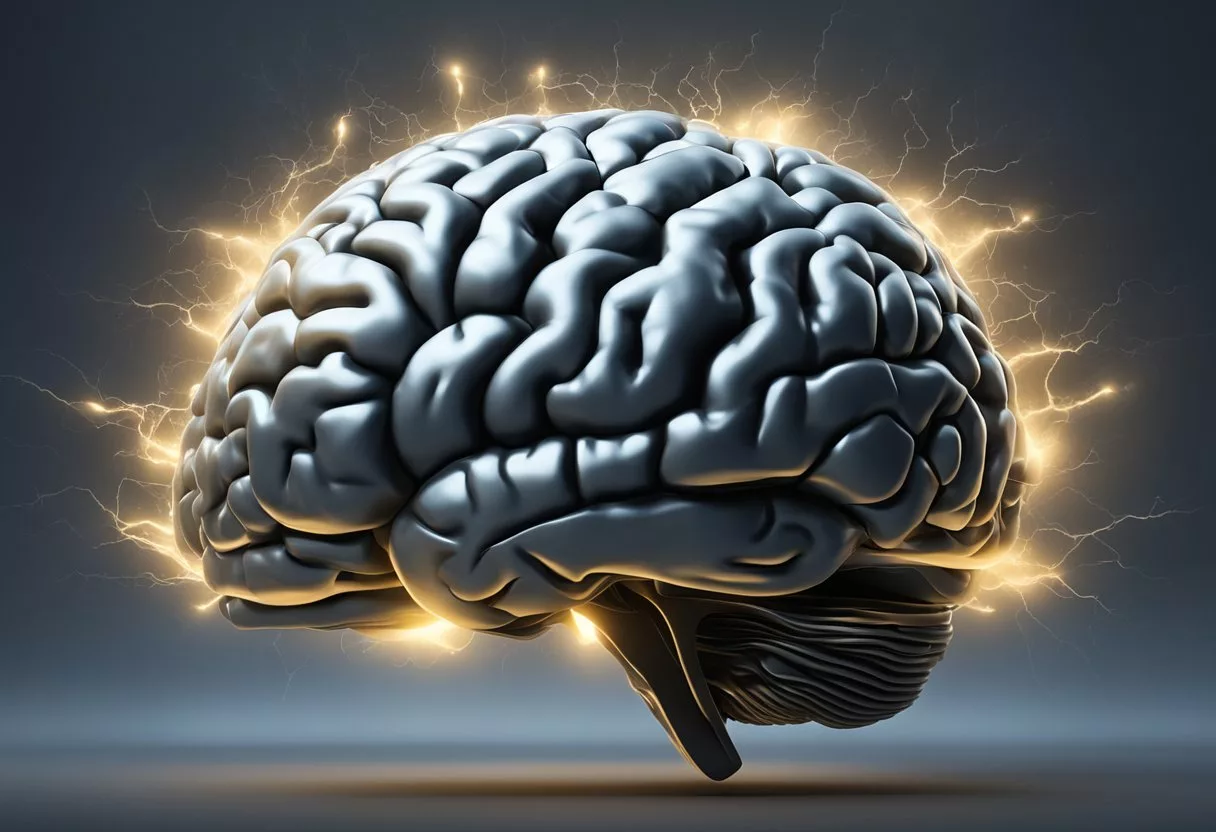The health of our brains is paramount to how we experience life, as it affects our thoughts, emotions, and actions.
Many factors can have a negative impact on brain health, from lifestyle choices to environmental influences.
Chronic stress, for example, is a known detriment to cognitive function, making it harder to concentrate and remember information.
Individuals who encounter stress from major life changes, financial struggles, or relationship issues can feel these effects more prominently, leading to a decline in overall mental wellness.

In addition to stress, certain habits can also harm brain health.
High consumption of caffeine, especially in adolescents who frequently use technology late into the evening, can disrupt sleep and negatively affect cognitive abilities.
Other behaviors, such as physical inactivity and poor diet, can further compromise brain function and contribute to cognitive decline over time.
Psychological and social factors, like experiencing early life trauma or sustaining unhealthy relationships, can also impair brain development and affect regulation, setting the stage for long-term neurological and psychological repercussions.
Key Takeaways
- Stress and lifestyle choices can detrimentally impact cognitive function and mental well-being.
- Sleep quality, nutrition, and exercise play critical roles in maintaining healthy brain function.
- Early psychological experiences and social interactions can influence long-term brain health.
Fundamentals of Brain Health

Understanding the fundamentals of brain health is crucial to maintaining cognitive functions and preventing brain decline.
Several factors can negatively influence brain health and are essential to monitor:
- Diet: Nutrition plays a significant role in brain health. Diets lacking essential vitamins and omega-3 fatty acids can lead to compromised cognitive function.
- Sleep: Sleep is integral for cognitive processes. Poor sleep patterns can accelerate cognitive decline and negatively affect brain function.
- Stress: Chronic stress can have deleterious effects on the brain, leading to issues in both cognitive function and overall brain health.
- Physical Activity: Regular exercise contributes to the maintenance of healthy brain function. A sedentary lifestyle can hasten cognitive decline.
- Toxins and Substances: Exposure to toxic substances, heavy metals, and overuse of alcohol or drugs can harm the brain.
Maintaining cognitive health involves a proactive approach to these factors. One may review principles regarding care in brain health and how various factors influence the brain structure and function.
An individual’s mental health impacts their brain health, and strategies for maintaining it are discussed in publications like the World Health Report 2001.
It is also recognized that maintaining brain health is a global issue. The Lancet Commission on global mental health and sustainable development explores the interconnectivity between mental health and cognitive function, highlighting the importance of integrative approaches to health care.
Lifestyle Factors Influencing Brain Health

Factors such as diet, exercise, and stress have notable effects on brain health. Making conscious lifestyle choices can lead to better neurological function and lower the risk of cognitive decline.
Diet and Nutrition
A balanced diet is crucial for brain health. Diets high in sugar can increase the risk of obesity and type 2 diabetes, which in turn can affect brain health.
Conversely, consumption of fish, rich in omega-3 fatty acids, has been linked to better heart health and neuroprotection.
Physical Activity and Exercise
Regular physical activity boosts heart health and blood pressure, which may help prevent high blood pressure—a known risk factor for cognitive decline.
Exercise also stimulates the release of growth factors, chemicals that affect the growth of new blood vessels in the brain, and the survival of new brain cells.
Sleep Quality and Patterns
Sleep is pivotal for brain health. Quality and consistent sleep patterns support the removal of toxins from the brain that accumulate during waking hours.
Poor sleep can impair mental health, reducing cognitive functions like memory and attention.
Alcohol and Substance Use
Heavy alcohol use and smoking are detrimental to brain health. They can lead to alterations in brain structure and function, increasing the risk of heart disease and negatively impacting blood sugar and blood pressure.
Chronic Health Conditions
Conditions such as heart disease, high blood pressure, diabetes, and obesity can impair brain function and structure.
Proactive management of these conditions is vital for maintaining cognitive health.
Brain-Enriching Activities
Engagement in activities that stimulate the brain, such as learning, reading, and completing tasks, can improve brain function and encourage neuroplasticity, which is the brain’s ability to form new neural connections throughout life.
Digital Technology Use
Excessive screen time on smartphones, social media, and other apps can impact sleep, mood, and relationships.
Managing digital technology use is critical for maintaining healthy sleep patterns and social interactions.
Social Interactions and Community
Socialization with friends, family, and the community can protect against brain health decline.
Social isolation and loneliness can negatively affect mental health, leading to depression and anxiety.
Negative Emotional Experiences and Stress
Prolonged stress can lead to mental health disorders like depression and anxiety.
Effective stress management techniques and the treatment of chronic stress or traumatic events are beneficial for long-term brain health.
Environmental Factors
Exposure to pollution and toxic substances can adversely impact cognitive function. Creating a safe and healthy living environment is an important aspect of maintaining brain health over time.
Cognitive Health Across the Lifespan

Cognitive health is a vital aspect of overall well-being that can be influenced by various factors throughout a person’s life. From the developmental stages of childhood to the complexities of aging, understanding these influences can be crucial for maintaining mental acuity and preventing cognitive decline.
Childhood and Brain Development
Childhood is a critical period for brain development, with cognitive foundations being laid that will affect a person’s intelligence and cognitive abilities for the rest of their life.
During this time, the brain undergoes significant growth and maturation, influenced by both genetics and environmental factors.
For instance, enriching environments that include supportive caregiving and learning opportunities can enhance cognitive development in children.
Aging and Cognitive Abilities
As individuals age, it is common to experience changes in cognitive functions. Aging can lead to variations in the ability to process information, remember, understand, and manage emotions.
However, not all cognitive functions decline with age; some, like vocabulary, may improve.
Practices such as regular physical exercise and engaging in mentally stimulating activities can promote cognitive health in older adults and mitigate the natural effects of aging on cognitive abilities.
Risks and Prevention of Dementia
Dementia, including conditions like Alzheimer’s disease, represents a decline in cognitive functions severe enough to interfere with daily life and independence.
It can involve multiple cognitive impairments, ranging from memory loss to impaired reasoning.
While aging is the strongest known risk factor for dementia, healthy lifestyle choices such as a balanced diet, not smoking, maintaining social connections, and managing conditions like diabetes and hypertension can reduce the risk of developing dementia and mild cognitive impairment.
Effects of Behavioral and Lifestyle Choices

Behavioral and lifestyle choices play a crucial role in the well-being of our brain health. These choices have a direct impact on psychological states, physical health, cognitive function, and overall mental wellness.
Psychological Impact of Loneliness
Loneliness can lead to significant changes in brain function, possibly increasing the risk of depression. Isolation has shown to cause cognitive decline. It can also alter neuronal connectivity, suggesting a strong link between social interactions and mental acuity.
Influence of Physical Health on Cognition
Physical health is closely tied to cognitive performance. It results from lifestyle habits such as regular exercise and a balanced diet. Poor cardiovascular health can impair brain function and lead to memory issues.
Relevance of Sleep to Learning and Memory
Sleep quality has a profound effect on the brain’s ability to learn and form memories. Studies indicate that exposure to light during sleep can adversely affect cognitive functions the following day. This demonstrates that restful, uninterrupted sleep patterns are essential for learning efficiency and memory consolidation.
Impact of Diet on Cognitive Health
Dietary choices, particularly the consumption of high levels of sugar and processed foods, can have a detrimental effect on brain health. Excessive glucose can alter the brain’s ability to process information and affect overall mental health, underscoring the importance of a nutrient-dense diet for maintaining cognitive vitality.
Psychosocial Factors Affecting Brain Health

Psychosocial factors can have substantial impacts on brain health, specifically influencing mood, cognition, memory, and self-control. Understanding these influences is crucial for effective stress management and enhancing overall well-being.
Stress and Emotional Regulation
Chronic stress is one of the most significant psychosocial factors that can harm brain health. It affects the body’s stress response systems and can lead to impaired emotional regulation, negatively impacting cognition and memory. Effective stress management techniques are essential to mitigate these effects and preserve brain function.
Importance of Social Support Systems
The quality of social support from relationships and community has a profound effect on psychological health. Strong social connections foster a sense of belonging and provide resources for coping with stress, thereby protecting brain health. On the other hand, inadequate social support can lead to increased vulnerability to the negative effects of psychological factors.
Effects of Technology and Multi-tasking
Frequent use of technology and social media, as well as excessive screen time, can influence the brain’s ability to manage stress and regulate mood. Moreover, multi-tasking, often exacerbated by technology, can weaken cognitive functions like memory and attention, necessitating a mindful approach to digital consumption.
Role of Education and Continuous Learning
Lastly, engagement in education and continuous learning throughout life is beneficial for brain health. It bolsters cognitive reserve and promotes mental agility, aiding in the preservation of memory and cognitive functions in the face of various psychosocial stressors.
Preventative Measures and Positive Interventions

Effective preservation of brain health involves a proactive approach, encompassing various strategies such as stress management, cognitive exercise, health check-ups, and activities fostering resilience. These interventions act to limit risk factors and bolster brain function.
Stress Management Techniques
Managing stress is critical for maintaining cognitive health. Techniques such as meditation and yoga can improve focus and attention, offering control over stress responses. Engaging in regular stress management practices can reduce the impact of stress on cognitive function and overall brain health.
Cognitive Training and Mental Exercises
Cognitive training includes activities that stimulate intelligence, reasoning, learning, and judgment. Puzzles, memory games, and problem-solving exercises not only act as a workout for the brain but can also enhance cognitive function and possibly slow age-related decline. Consistent mental exercises ensure continuous cognitive growth and maintenance.
Health Monitoring and Regular Check-ups
Routine health appointments and monitoring by a healthcare provider can identify potential health issues that may impact brain health. Early detection and control of conditions such as hypertension or diabetes are crucial. Advice from a doctor is instrumental in adjusting lifestyle or medication to maintain optimal cognitive function.
Building Resilience Through Positive Activities
Participating in activities that promote growth and motivation are valuable for brain health. This can include volunteer work, pursuing hobbies, or practicing gratitude, which foster a positive mindset and resilience. Building resilience through such activities can lead to better self-control, improved brain function, and reduced negative impact of stressors on brain health.
Understanding the Science Behind Brain Health

Brain health is influenced by a complex interplay of factors ranging from genetic makeup to lifestyle choices. Recent neuroscientific studies provide insight into how these elements can either support or impair cognitive function.
Neuroscientific Studies and Research
Researchers and neuroscientists at various research centers study brain health by analyzing patterns, functions, and structures within the brain. Significant neuroscientific studies indicate that sustained exposure to stress can alter brain cells and neural pathways. This research underscores the importance of managing stress to maintain optimal brain health.
Role of Genetics and Brain Plasticity
Genetics play a critical role in an individual’s predisposition to certain neurological conditions. Yet, brain plasticity, the brain’s ability to change and adapt as a result of experience, suggests that lifestyle factors can also shape and influence brain health. These neuroplastic changes can be positive or negative, depending on the stimuli and activities involved.
Connections Between Heart and Brain Health
The linkage between heart health and brain function is a focal subject of the American Heart Association. Factors that increase heart rate and blood pressure can, over time, damage delicate brain tissue, highlighting the need for a heart-healthy lifestyle to support cognitive health.
Impact of Hormones and Neurotransmitters
Hormones and neurotransmitters are chemical messengers playing pivotal roles in brain health. Imbalances in hormones like cortisol, associated with stress, can impair cognitive abilities and emotional regulation. Conversely, positive neurotransmitter activity can enhance neuronal connectivity and lead to improved brain function.
Everyday Factors and Brain Health

Maintaining brain health involves a multi-faceted approach including diet, physical activity, and adequate sleep. It’s also important to understand how technology use and societal pressures can impact mental wellness and cognitive function.
Dietary Choices
Diet plays a crucial role in maintaining cognitive function and well-being. Consuming omega-3 rich fish may support brain health, while diets high in sugar can lead to weight gain and reduced attention span. It’s essential to opt for a balanced diet to support brain function and mood.
Physical Activity’s Role in Well-being
Regular physical exercise isn’t just good for the body; it’s beneficial for the brain too. It can alleviate symptoms of depression, improve memory, and enhance overall cognitive function. Physical activity is a cornerstone of a healthy lifestyle that promotes well-being.
Managing Sleep Disorders
Sleep problems such as insomnia can severely impact cognitive function and mood. Getting regular, restful sleep is vital for the brain to clear out toxins that accumulate during the day, directly tying into one’s overall mental well-being.
Coping with Negative Effects of Technology
Overuse of technology can engage the reward system in unhealthy ways and contribute to attention deficits. It is important to set boundaries on technology use to mitigate its negative effects on sleep and mental health.
Navigating Work-Life Balance
An overwhelming workload can lead to chronic stress, impacting cognitive function and well-being. Achieving a healthy work-life balance is necessary to reduce stress and create space for mental recovery and productivity.
Addressing Societal Pressures and Expectations
Societal expectations can evoke feelings of fear, pain, and threats to our well-being. Individuals need to find strategies to cope with pressure and meet their own health and well-being goals, free from external stressors.
Frequently Asked Questions

In addressing brain health, it’s essential to consider lifestyle factors and everyday choices that can have long-lasting effects. These frequently asked questions hone in on the specifics that influence brain functionality and wellness.
Which daily habits are known to cause harm to brain health?
Certain habits such as smoking, excessive alcohol consumption, poor sleep patterns, and prolonged stress are known to be harmful to brain health. These behaviors can lead to a reduced cognitive function over time.
Are there specific foods that are detrimental to brain cell health?
Foods high in added sugars and saturated fats can negatively affect brain cell health. Consistently consuming such foods may impair brain plasticity and increase the risk of neurodegenerative diseases.
What signs indicate an unhealthy brain?
Signs of an unhealthy brain can include persistent memory problems, difficulty concentrating or making decisions, and experiencing confusion or disorientation. These symptoms may suggest the need for a medical assessment.
How do lifestyle choices impact overall brain well-being?
Lifestyle choices such as physical inactivity, poor diet, lack of mental stimulation, and inadequate social interactions can lead to a decline in brain health. Engaging in activities that stimulate the mind and foster social connections is beneficial for maintaining brain well-being.
Can long-term habits have a negative impact on cognitive function?
Yes, long-term habits such as insufficient physical activity, chronic stress, and lack of proper nutrition can have a negative impact on cognitive function. These habits can lead to cognitive decline. They can also increase the risk of dementia.
What environmental factors can contribute to the deterioration of brain health?
Environmental factors can contribute to the deterioration of brain health. These include exposure to pollutants and toxins, extreme noise levels, and living in areas with poor air quality.
These factors can cause inflammation and oxidative stress that damage brain cells.